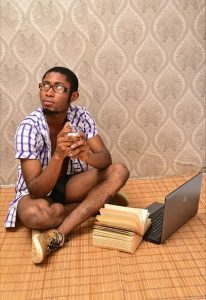Obaji-Nwali Shegun comes from Port Harcourt, Nigeria. This is his second submission to the Babishai Haiku contest, a form of writing he says, is extremely demanding. Obaji’s purpose-driven nature leads him to work diligently and passionately.
Obaji (Courtesy photo)
What drew you to enter for the competition?
First of all, I offer a colossal credit to the sedulous and purpose-driven judges for this recognition. Yes! Even if I’d not be a able to row the boat further to the winners’ range of the sea (In my tiny mind though) being among the shortlisted poets, only, is a tender draft, self-healing and heart-warming as it is gratifying. The inclusion of my names and wee lines in the list is ,to me, like lifting a twiddling crab from its hole and setting it in the cue of hyenas, buffalos and leviathans. Oh yes! Such metaphors decorously define the poets making the shortlist. Their creativities transfixed, electrified and compartmentalized me the almost hundred times I circled the arts. The lines shrewdly and astutely picked by irrefutably great and sophisticated Haiku masters muscularly shocked me, and like Carlsberg’s Jacobsen vintage beers excessively taken made me blotto and wholly sloshed.
I was vastly overwhelmed, when I saw my poem in the list. What was I doing when the bang came? What was I doing? Ok, I was in a Vesta Cyber Café in the West of Rivers submitting a short story to Quramo short story prize ‘ bam’ my Gmail inbox spilled it. I felt gashed not with a sword but with hyper exhilaration. I wanted to leap off the swivel chair holding me all the while, but there was a serious crowd that will hardly fancy my yelp and squeal of triumph. The crowd circumscribed the way I had arranged to celebrate the dawn of my victories; if at all I’ve got more victories ahead, but I should believe i have more on the way.
Talking on the magnet that pulled me like metal into this soul-saving competition I’d have to admit its my immense love for Haiku. Last year I had mistakenly stumbled on a word ‘Afriku’ while surfing the internet and the curiosity to unravel the denotation and connotation of this completely new word ushered me into a vast pool of teensy lines that ended up burying me in wonderment and reverence. The capability of words among 17 syllables to effortlessly carve a hole of longing, nostalgia and bitterness in my heart and thereafter abandoned me panting, grunting and facing the images and sounds of the glitches perturbing the continent, the splendour of nature wrapped in aesthetic words instantaneously compelled me into falling in love with Haiku poetry. And since then I decided to study hard, I meant very hard realizing Haiku is never, never and never as easy to write as nippy as it is convincingly is. Haiku is an exploration, getting a perfect Haiku done demands you jettisoning the comfort of your minds zone and going exploring. If you never darted into the dark with shovel and digger, you’d always come up with a flat and passionless Haiku. This was a big fact I realized after embracing Haiku my new love. I realized Haiku is an angelic maiden sitting in the shade of tree physically convoluted but interiorly soft and lovely, only demanding anyone who desires to love her to follow the particular principles with which the wavy routes to her realm is laced.
I clapped few words together and joined the 2016 Babish Haiku contest but failed. But I choose not to be deterred or unnerved, in that I was indeed in love with the power of Haiku, its ability to surround a lot of issues in a jiffy and get a large amount of work done and not because of the competition or incentives. Let me digress a bit, Haiku thought me, I’d sometimes fail in letting her fling me to places if I was only interested in winning a competition. And she’s right, am already on places. I am a winner by getting shortlisted. It’s even enough for me even if I’d not step further.
Now let me flow on, I relished Haiku, the long-winded and eye-opening type of poetry as I enthusiastically immersed my body and soul in the noble genre of poetry. 2017 Babishaiku contest came and I effortlessly joined the race, realizing I was good to go.
So, to be frank with you my love for Haiku, its beauty and convolutedness and a sense that I’ve mastered the art ,to a particular encouraging level, motivated my interest of entering the competition.
Do you have a particular personal story with the Haiku?
A particular personal story with Haiku? I elaborately shared it in the first question but I’d complete the story this way. When I bumped into a WordPress blog outlining Haiku poems written by an African a particular poem stung me, its tenderness and featheriness. Its fluidness and readability- the poem that would become my port of call in this remarkable poetry genre. The poem is one of the Haiku poems written by Adjei Agyei-Baah. And it reads:
Lights return
The cheers of kids
Stamp out the crickets
Yes, simple as it seems, it blew my mind away. How this very few lines naturally and readily captured a moment? A moment I could relate to as an African and a Nigerian living in that part where you’d have to wait for NEPA lights for weeks and when it comes you go feral and haywire in unprecedented jollity. So, I felt unleashing my mind piece by piece and yet ensure a germane sense would be a good vocation. A fact about Haiku is, once you mastered the art, the organization of its figure you’d tell the world your stories as nippily as possible. Even the so-many-schedules-entwined individuals will find time to gulp your Haiku and capture the message without all the ado posed by novels and short stories. And like seriously am enjoying Haiku. It saves my time , energy and free me from the rigour of expectorating too many words to tell a story.
What do you feel towards the shortlist in general?
Wow, wow, wow. As I mentioned earlier, the intricacies or multifariousness, intriguing imageries and sounds and brilliance of the shortlisted poems is extremely amazing and super-terrific. Each poem delved robustly into divergent issues and moments one could smoothly relate to. And the judges? I doff my headdress for them. A shortlist indubitably reflects the wit, cognoscenti and savviness of it judges. The judges are masters in this art. They’ve started a revolution the whole of Africa would very soon turn to and enjoy absolutely. Afriku is a wave and very soon its altruistic fragrance will swallow Africa and it will easily, as it does, on larger scale, enlighten us, offering the assizes with which to confront the numerous challenges unsettling the continent. Once again the shortlist is super-terrific and mind-blowing.
What motivations do poets need to keep writing in this ridiculously competitive world that vies for their attention?
You’ve got a good question here. My candid advice to poets out there is to read and read many poems and write and write many poems. If your reading is shallow, your writing will definitely be light and narrow. Like, if Haiku is your forte read plenty of it. Mamba Journal is there, Mercy Ituri and Adjei Agyei-Baah blogs are there for you to guzzle (I mentioned them cos their works introduced me into Haiku, ). If it’s other forms of poem go for them via the search internet engines. And I promise you of incredible places . Please, lastly, do not write because you want to win an award write for the joy you derive in what you write and the sky will be your limit.
If your 2017 submission was food, what would it be?
Ha ha ha…… as an Effium-Eboyian if my submission should be food it would be esisa and ugu soup with plenty okporoko and anu nchi, my mentor, Obinna Udewe will understand this than anyone. But, since I presently live in Port-Harcourt I’d prefer Edikang ikang and Afang soup. Ask, Ngozi Olivia Osuoha she’d giggle.
Obaji’s shortlisted haiku is here:
roadside
gaunt vultures nipped
a zonked drunkard
We at Babishai, congratulate him again. The winners will be announced at the #Babishai2017 Poetry Festival dinner on Sunday 6 August at Humura Resort, Kitante Close. Cards are on sale at 40,000/- Call +256 703147862. The full festival programme is here.
The full winning haikus are here:
http://bnpoetryaward.blogspot.ug/2017/07/the-babishai-2017-haiku-shortlist.html

